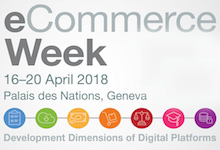E-trade readiness assessments in LDCs: From recommendations to actions
16 Apr 2018 10:00h - 11:30h
Event report
[Read more session reports from the UNCTAD E-Commerce Week 2018]
This session, was moderated by Ms Shamika N. Sirimanne (Director, Division of Technology and Logistics (DTL), United Nations Conference on Trade and Development (UNCTAD)). Ms Isabelle Durant (Deputy Secretary-General, UNCTAD) introduced the least developed countries (LDCs) chosen for UNCTAD’s eTrade Readiness Programme (eT-Ready): Bhutan, Cambodia, Laos People’s Democratic Republic, Liberia, Myanmar, Nepal, and Samoa. National government representatives shared the benefits of the assessment, strategies for implementation, and barriers that they face in embracing a digital economy.
Mr Sven Callebaut (Senior Adviser and UNCTAD Consultant) shared the objectives, methodology, and desired outcomes of the eT-Ready assessment: (i) assess countries’ strengths, weaknesses, gaps, and opportunities in the seven eTrade for All policy areas; (ii) conduct surveys, in-country focus group discussions, and report drafting and validation; (iii) identify priority of actions to increase uptake of e-commerce. Callebaut reviewed the progress and challenges in Bhutan, Cambodia, and Samoa, which included growth in 4G mobile broadband, e-payment solutions, and digital policy development. He highlighted the completion of the Tui-Samoa subsea cable system that increases Internet affordability. Laos, Liberia, and Myanmar showed similar progress towards digitalisation. Setbacks for implementation in these LDCs are geographical and financial. The countries recognise the value in rapid assessment and the quality of the approach used, but need to engage all stakeholders to expedite the progress.
Mr Wilson Tarpeh (Ministry of Industry and Commerce, Liberia) explained that Liberia is behind in development of e-commerce. He stated that the government must provide the infrastructure for the private sector to develop in the digital realm. Liberia faces infrastructural post-war challenges, but they are directing resources to support e-commerce. Tarpeh underlined the government’s efforts to digitise tax payment and link the private sector to a large payment platform to streamline financial mobile processing.
Mr Aung Htoo (Deputy Union Minister of Commerce, Myanmar) highlighted the country’s progress, aided by the eT-Ready assessment. Htoo reported that the participation of foreign companies and the liberalisation of the mobile sector improved the national mobile coverage rate from 7% in 2013, to 80% in 2018. The digital economy is a top priority for the government. Increasing the digital presence in Myanmar shows potential for small and medium-sized enterprises (SMEs). He concluded by praising the role of the eT-Ready assessment in catalysing a conversation between the public and private sectors.
Mr Pan Sorasak (Minister of Commerce, Royal Government of Cambodia) commented on the answers that the eT-Ready assessment provided, and outlined an action plan to monitor progress in the digital field. Cambodia was the pilot country for the LDC assessment plan, and he believes this sparked the interest of the other LDCs to join the programme. They are pushing for policy creation regarding e-commerce law. Internet transactions are not new to Cambodia, but legal frameworks are now being enhanced. Sorasak shared the growing interest of angel investors and incubators for Cambodian tech start-ups. The readiness report maps the road to follow, and now their government is strategising with public and private community partners to continue the progress.
Mr Kham-Inh Khitchadeth (Ambassador and Permanent Representative of Laos) mentioned the role of youth in creating and conducting business online. The government has invested in e-commerce as a central element for the growth of their economy and supports the private sector’s digital initiatives. Their broadband services and digital payment solutions are still limited, partially due to geographical landscape obstacles. Ultimately, Khitchadeth shared Laos’s aims to ‘catch-up to its Asian neighbours’ for cross border e-commerce, and the eT-Ready assessment is assisting their progress.
The session ended with development partners sharing the role they play in the implementation stage. Ms Daniela Zehentner-Capell (Head of Division, Trade related Development Co-operation, Federal Ministry for Economic Cooperation and Development, Germany) stated that they are looking for innovative solutions in the implementation phase. Mr Teppo Markus Tauriainen (Director General for Trade, Ministry for Foreign Affairs, Sweden) mentioned Sweden’s financial contribution to four of the assessments. He advised LDCs against excessive regulation, in order to safeguard the openness of digitalisation. Finally, Ms Annette Mutaawe Ssemuwemba (Deputy Executive Director, Enhanced Integrated Framework (EIF)), shared their role in monitoring and prioritising the recommendations of the assessment. She ended with recommending greater engagement with governments and the private sector.
By Isabel Ashley
Related topics
Related event

